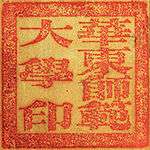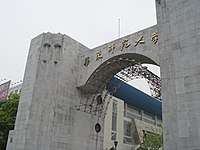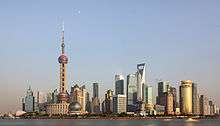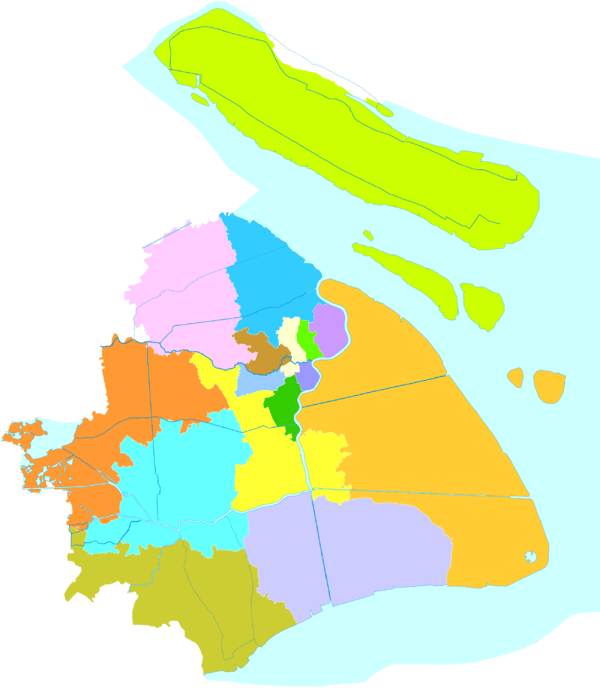East China Normal University
|
华东师范大学 | |
 | |
Former names | Shanghai Normal University (1972–1980) |
|---|---|
| Motto | 求实创造,为人师表 |
Motto in English | Pursue what we have not been taught, and practice what we are going to teach[1] |
| Type | Public (National) |
| Established | 1951 |
| President | Xuhong Qian |
| Students | 32,000 |
| Location | Shanghai, China |
| Campus |
Putuo Campus (1072.25 acres) Minhang Campus (2071.53 acres) |
| Colors | ECNU Red |
| Affiliations |
AALAU, BRICS Universities League Yangtze Delta Universities Alliance |
| Mascot | ECNU Lions |
| Website |
www |
| East China Normal University | |||||||
| Simplified Chinese | 华东师范大学 | ||||||
|---|---|---|---|---|---|---|---|
| Traditional Chinese | 華東師範大學 | ||||||
| |||||||
East China Normal University (ECNU) is a comprehensive public research university in Shanghai. It was formed in 1951 by the merger of the Great China University founded in 1924 and Kwang Hua University (est. 1925) which had its ultimate origins in the St. John's College established in the city in 1879. Its original role was to train teachers for secondary and higher education, as suggested in the name "Normal", but very soon housed top-class researchers and evolved into an elite research-intensive university.[2]
ECNU is now organized into more than 22 schools, colleges, and institutes, located in two campuses throughout Minhang and Putuo. The university comprises 2 affiliated schools across the Shanghai metropolitan area: NYU Shanghai in Pudong,[3] Asia-Europe Business School in Zizhu International Education Park. ECNU also maintains a National Forest Ecosystem Observation and Research Station in Tiantong National Forest Park, Ningbo, Zhejiang Province.
ECNU is a Chinese Ministry of Education Class A Double First Class University.[4] It is often considered to be one of the most prestigious universities in China and is internationally recognized, as evidenced by its partnerships with institutions around the world. Sponsored by the national program "Project 211" and "Project 985",[5] the university is a frontrunner in the nation's research and innovation,[6][7][8] and has been dubbed as the "Columbia of the East".[9] The university also has strong ties with the China Meteorological Administration, State Oceanic Administration and the Chinese Academy of Sciences.[10]
History


Origins
East China Normal University traces its roots to the formation of the St. John's College (later to become St. John's University) in 1879, and its heritage has had a definite and deep influence in the development of Chinese modern higher education.[11]
In 1879, St. John's College was founded by William Jones Boone and Joseph Schereschewsky, Bishop of Shanghai, by combining two pre-existing Anglican colleges in Shanghai. In 1905, the College became St. John's University, and became registered in Washington D.C. in the United States. It was the first institution to grant bachelor's degrees in China, starting in 1907.
After the May Thirtieth Movement in 1925, some academics and students left from the St. John's University, later forming the private Kwang Hua University to support the labor and anti-imperialist movement during the middle-period of the Republic of China era.
In 1924, after a student protest at the Xiamen University in Fujian Province, some academics fled north to Shanghai where they established what became the Great China University (also known as Daxia University).
Establishment of the university

After the founding of the People's Republic of China, East China Normal University was officially formed in 1951 by the merger of the Great China University and the Kwang Hua University, and was joined at the same time by a number of faculty members from Fudan University, Tongji University, University of Shanghai and East China PE Academy, making it the first national teacher training university of the People's Republic of China. This was done in part due to the government's desire to pool these institutions' resources into a single, stronger entity, cultivate talents with professional knowledge and promote the development of education in the country.
In the 1950s, the Chinese government regrouped the country's higher education institutions in an attempt to build a Soviet-style system. Under this policy, most of faculties from Saint John's University, Zhejiang University, University of Shanghai, Utopia University, Aurora University were incorporated into ECNU to form a comprehensive multi-disciplinary university. Some of the academics at the Tongji University and Jiaotong University were also transferred to ECNU.[12]
In March 1959, ECNU was authenticated as one of the first 16 National Key Universities in China, and this status was reaffirmed in 1978. From 1972 to 1980 (during the Cultural Revolution in mainland China), it was known as Shanghai Normal University, and in 1980 its original name was resumed.[13]

1980 to present

In June 1986, ECNU was selected to be one of the first 33 higher education institutions authorized, by the State Council, to establish their graduate schools. In 1996, ECNU passed the prerequisites appraisal and became one of universities sponsored by the major national program "Project 211". In 2006, the Ministry of Education and Shanghai Municipality signed into a partnership for co-sponsoring the development of the university, qualifying ECNU as a member of the "Project 985" and facilitating ECNU's efforts and progress toward a comprehensive, research-oriented and internationalized world-class university.
ECNU is now a nationally renowned university under the direct auspices of the Ministry of Education, boasting one of the most beautiful university campuses in China, the university is reputed as the "garden university". The University sponsors or supervises publication of more than 20 academic journals and periodicals. The library collection exceeds 4,000,000 volumes. 25 primary or secondary schools are affiliated to the university.
The development and transformation of China and the modernized international metropolis of Shanghai brings huge opportunities to the university for its progress. ECNU is working its way up steadfastly toward the goal of establishing itself as "an internationally renowned high-level research university".[14]
International partnerships
ECNU attaches great importance to the internationalization in its development and enjoys a wide influence and reputation in the world. The university has established strategic cooperative partnership with many world-renowned universities, such as École Normale Supérieure and its group in France, the University of Pennsylvania and Cornell University in USA, Tokyo University and Kobe University in Japan, and the University of Melbourne in Australia, the University of Warwick in the UK, etc. It has been carrying out academic exchanges with over 150 universities and institutions of Great Britain, France, Germany, Japan, the United States, Canada, Australia, Korea, and Russia, etc. ECNU plays host to a CIEE satellite campus, where 100 American college students study each semester. The university also runs an Online College of the Chinese language in collaboration with the National Office for Teaching Chinese as a Foreign Language (NOCFL), which is the first of its kind to be established in the country with over 5,800 students in 137 countries and regions. In 2008, it set up the NOCFL Study and Training Base for International Chinese Teachers.
- In 2002 the Ecole Normale Supérieure in Paris, the École normale supérieure de Cachan, and the École normale supérieure de Lyon set up a Master's-PhD programme at East China Normal University in Shanghai.[15][16] An ENS campus is housed in the ECNU at the Aspiring Researchers Institute and at the Franco-Chinese Advanced Studies Institute.[17]
- In 2007, the EMLYON Business School opened the official EMLYON Asia Campus in the heart of the ECNU campus.[18]
- In 2008, the Cornell-ECNU Center for Comparative Culture was jointly funded by Cornell University and ECNU.[19]
- China's first Sino-American university – New York University Shanghai (NYU Shanghai) – was co-established by New York University and ECNU and was approved by the Ministry of Education in early 2011.[20]
Study China Programme
Along with several other Chinese universities, East China Normal University has hosted the United Kingdom (UK) government-funded Study China Programme for a number of years.[21] In this programme, students from UK institutions spend one to two summer months studying Mandarin Chinese and Chinese culture at a university in China. The programme is organised by the University of Manchester and is fully funded by UK government bodies, such as the Department of Business, Innovation and Skills. Its purpose is to strengthen ties between UK university students and China, in particular as relatively few British students enroll in degrees in China. The programme has increased relations between ECNU and numerous leading UK universities.[22]
Diplomats' Program
Sponsored by Shanghai Municipal Education Commission and Shanghai Foreign Affairs Office, the Diplomats' Program has been organized by ECNU since 2011. In this program, consular officials from over 20 countries spend two months during summer studying at East China Normal University.[23]
Academics

At present the university is made up of 24 full-time schools and colleges, 2 unconventional colleges and 5 advanced research institutes, with 58 departments offering 79 undergraduate programs. The University also comprises 3 affiliated schools: NYU Shanghai, Asia-Europe Business School and ECNU-UNC School of Sino-American Innovative Education.
Full-time schools and colleges
- Faculty of Education
- Faculty of Economics and Management
- School of Humanities and Social Science
- School of Social Development
- School of Foreign Languages
- International College of Chinese Studies
- School of Psychology and Cognitive Science
- Preschool and Special Education School
- School of Sports and Health
- School of Communication
- School of Art
- School of Design
- School of Urban & Regional Science
- School of Ecological and Environmental Sciences
- School of Geographic Sciences
- School of Life Sciences
- School of Chemistry and Molecular Engineering
- School of Science and Engineering
- School of Information Science and Technology
- School of Computer Science and Software Engineering
- International Teachers College of Chinese Language and Culture
- Meng Xiancheng College (Teachers College)
- School of Data Science and Engineering
Unconventional colleges
- College of Continuing Education
- College of Distance Education
Advanced research institutes
- Institute of Estuary and Coastal Research
- Institute for Advanced International and Regional Studies
- Institute for Advanced Interdisciplinary Studies
- Institute of Arts
- Si-mian Institute for Advanced Studies in Humanities
Among them, the School of Computer Science and Software Engineering is the amalgamation between the Department of Computer Science and Technology and the former Software Engineering Institute which is one of the 35 statewide pilot schools of software engineering granted by Ministry of Education in 2001; the International College of Chinese Studies is among the eight State Bases for Teaching Chinese as a Foreign Language, certified by the Ministry of Education. ECNU is designated as one of the National Liberal Arts and Basic Sciences Training and Research Bases in its disciplines of Chinese, History, Mathematics, Geography, Psychology and Physics.
ECNU's Business School was founded by the pioneer of China's Economics and Financing studies, Prof. Chen Biao Ru. Hence, the Business School of ECNU inherited the good tradition and enjoys top reputation in the economic and financial circle in China.
The Ministry of Education's Training Center for Secondary School Principals at ECNU is a state base for the training of secondary school principals in Mainland China and advanced studies of those in Hong Kong, Macau and Taiwan. ECNU is the only university in China designated as a national training center for elite secondary school principals and enjoys the reputation as the "Whampoa Military Academy" for secondary school principals.
Research

The university is officially authorized to offer programs:
- in two of the Primary Disciplines and five of the Sub-Disciplines, which are enlisted as National Key Disciplines;
- in five of the disciplines, which are enlisted as Preparatory National Key Disciplines,
- in 12 disciplines enlisted as Shanghai Key Disciplines.
Key laboratories
It has two State Key Laboratories, one National Field Observation and Research Station, six Key Labs or Engineering Centers, and six Key Research Bases for Humanities and Social Sciences of the Ministry of Education. ECNU is authorized to offer 112 doctoral programs covering 14 Primary Disciplines, 178 master's programs in six specialties, i.e., Education, Public Administration, Engineering, Physical Education and Business Administration, and to set up 14 post-doctoral mobile research stations.
State key laboratories
Key laboratories of provincial level and ministerial level
- Key Laboratory of Brain Functional Genomics, Ministry of Education
- Key Laboratory of Geography-Information Science, Ministry of Education
- Shanghai Insititute of Brain Functional Genomics[26]
- Shanghai Key Laboratory of Regulatory Biology [14]
- Shanghai Key Laboratory of Green Chemistry and Green Chemical Process
- Shanghai Key Laboratory of Urbanization & Ecological Restoration
- Shanghai Key Laboratory of Trustworthy Computing[14]
Key research bases in humanities and social science
Joint Research Centre
Faculty and staff
ECNU has a faculty body of over 4,000, among whom there are 2000 full-time teachers (including over 1,200 professors or associate professors), 14 academicians of the Chinese Academy of Sciences or Chinese Academy of Engineering (six of them are academicians of both academies), 11 members of the State Council Academic Appraisal Committee, eight specially hired professors or lecture professors for the Yangtze Scholar Award Program sponsored by the Ministry of Education, nine "state-level talents" chosen by the New-Century Talents Project, ten National Outstanding Youth Fund award winner, 80 specially hired professors or lecture professors for ECNU's Zijiang Scholar Award Program, and 105 tenured professors.
Campus

With campuses in Minhang and Putuo District totalling an area of over 220 hectares, East China Normal University has long been reputed as a "Garden University" for its beautiful campus scenery.
North Zhongshan Road Campus (Putuo Campus)
The previous main campus was located in the Putuo District of Shanghai, formerly a campus of the Great China University. The campus is an enclosed campus of gardens, lawns, and historic buildings interspersed with modern facilities, in a convenient location in downtown Shanghai. The University also provides frequent transportation by shuttle bus to its new Minhang Campus.
The campus still houses a variety of scientific research institutions, such as State Key Laboratory of Estuarine and Coastal Research and State Key Laboratory of Precision Spectroscopy.
The university's athletic facilities include an outdoor track, outdoor basketball courts, indoor basketball courts, and indoor tennis and badminton courts. The university lacks a traditional indoor gymnasium with running/biking machines, free weights, and weight machines.
Minhang Campus
The Minhang new campus is located in the Minhang District on the outskirts of metropolitan Shanghai. Most administrative and academic framework of the university and the majority of undergraduate and graduate students are situated at this campus, which is accompanied by the Minhang Campus of Shanghai Jiao Tong University.
Notable people
Alumni
Writer
- Chen Danyan (陈丹燕): Writer.
- Dai Houying (戴厚英): Writer.
- Ge Fei (格非): Writer. Professor of literature at Tsinghua University.
Academics
- Yu Lizhong: Chancellor of New York University Shanghai.
- Wang Xingyu (王行愚): President of East China University of Science and Technology (1994.03–2004.07).
- Lu Shanzhen (陆善镇): President of Beijing Normal University (1995–1999).
- Wu Haishun (武海顺): President of Shanxi Normal University (2005.11-),
- Jia Suotang (贾锁堂): President of Shanxi University (2012.08-).
- Zhu Min (朱民): Chair of the University Council of Donghua University (2012.11-).
- Yuan Zihuang (袁自煌): Chair of the University Council of Hefei University of Technology (2014.05-).
- Ma Qinrong (马钦荣): Chair of the University Council of Shanghai University of Finance and Economics (2004.07–2012.07).
- Chen Dubin (陈笃彬): Chair of the University Council of Fuzhou University (2007.03–2011.12).
- Xi Nanhua (席南华): Academician of the Chinese Academy of Sciences. Vice-President of University of Chinese Academy of Sciences.
- Song Daxiang (宋大祥): Academician of the Chinese Academy of Sciences.
- Xue Yongqi (薛永祺): Academician of the Chinese Academy of Sciences.
- Zhu Shiyao (朱诗尧): Academician of the Chinese Academy of Sciences.
- Liu Boli: Academician of the Chinese Academy of Engineering.
- Stephen Cheng (程正迪): Academician of the National Academy of Engineering, United States.
- Lu Bai (鲁白): Senior Investigator of National Institutes of Health.
- Joe Z. Tsien: Neuroscientist, Georgia Health Sciences University.
- He Jifeng: Academician of the Chinese Academy of Sciences and academic at ECNU.
- Yuan Zhongyi: Archaeologist, praised as "the father of the Terracotta Warriors".
- Mitchell Ho (何苗壮): Senior Investigator, National Institutes of Health.
In politics
- Wang Huning (王沪宁): Member of the Secretariat of the CPC Central Committee and director of Policy Research Office of the CPC Central Committee.
- Li Yuanchao (李源潮): Vice President of the People's Republic of China.
- Cui Tiankai (崔天凯): Chinese Ambassador to the United States.
- He Xian (何宪): Vice Minister of the Ministry of Personnel of the P.R.China.
- Han Zheng (韩正): Chinese politician, and a member of the Politburo Standing Committee of the Communist Party of China, serving as First Vice Premier of the State Council since March 2018.
- Chen Hao (陈豪): Governor of Yunnan province,China.
- Yin Yicui(殷一璀): Chairwoman of the Shanghai People's Congress.
In business and media
- Xue Peijian (薛沛建): President of Shanghai Media & Entertainment Group.
- Jason Jiang (江南春): Founder of Focus Media.
- Dong Qing (董卿): Television host.
In sport
- Liu Xiang (刘翔): Gold medalist of 110-meter hurdles in the 2004 Summer Olympics.
Study abroad
- Glenn Duffie Shriver: From Grand Valley State University, he did a study abroad program at ECNU. He was later convicted in the U.S. of attempting to commit espionage.[34]
Notable faculty members
- Meng Xiancheng: Educator, the first president of East China Normal University.
- Li Linsi: Educator and diplomat who has been recognized as one of the key figures in modern Chinese cultural and diplomatic history.
- Shen Zhihua: Professor of history at ECNU, expert in the history of the Soviet Union, Sino-Soviet relations, and the Cold War.
- Lü Simian: Chinese historian, former professor of history at ECNU.
- Shi Zhecun: Author, former professor of Chinese Language and Literature.
- Hu Huanyong: Demographer, forefather of modern Chinese demography and the founder of China's population geography.
- He Jifeng: Computer scientist, member of the Chinese Academy of Sciences.
- Ghil'ad Zuckermann: Linguist, revivalist.
Alumni associations
Addresses
- North Zhongshan Road (Putuo) Campus: 3663 North Zhongshan Road, Shanghai 200062, P.R. China.
- Minhang Campus: 500 Dongchuan Road, Shanghai 200241, P.R. China.
See also
References
- ↑ "童世骏|走出校门时,请带着校训一起远行". Retrieved 2017-05-22. . News.ecnu.edu.cn. Retrieved on 2017-05-22.
- ↑ "ECNU Overview". Retrieved 3 July 2015.
- ↑ "About NYU Shanghai". Retrieved 3 July 2015.
- ↑ "教育部 财政部 国家发展改革委 关于公布世界一流大学和一流学科建设高校及建设 学科名单的通知 (Notice from the Ministry of Education and other national governmental departments announcing the list of double first class universities and disciplines)".
- ↑ "提示信息". Archived from the original on 9 October 2014. Retrieved 3 July 2015.
- ↑ "KU Leuven seals partnerships with top Chinese universities". Archived from the original on 6 March 2014. Retrieved 3 July 2015.
- ↑ "Dossier/Chine Université de Genève". Retrieved 3 July 2015.
- ↑ Xu Lin (徐林). "Top 10 normal universities (teachers' colleges) in China". Retrieved 3 July 2015.
- ↑ "Universität Wien". Archived from the original on 2015-07-21. Retrieved 2015-07-19.
- ↑ ECNU Inks Deal with China Meteorological Administration
- ↑ "Foreword to the First Issue of ECNU Review". ECNU. Archived from the original on 22 July 2015. Retrieved 24 February 2013.
- ↑ "History". Retrieved 2017-05-22. . English.ecnu.edu.cn (1951-10-16). Retrieved on 2017-05-22.
- ↑ About ECNU Archived 2012-07-02 at the Wayback Machine.
- 1 2 3 4 East China Normal University, China. (in English)
- ↑ "Joint Graduate Program with ENS Group – ECNU". Archived from the original on 2015-07-05. Retrieved 3 July 2015.
- ↑ "ENS Cachan – Ouverture internationale". Archived from the original on 5 March 2008. Retrieved 3 July 2015.
- ↑ "The ENS in Shanghai". Archived from the original on 2012-10-19. Retrieved 2012-09-21.
- ↑ "Shanghai Campus". Archived from the original on 2012-09-19. Retrieved 2012-09-21.
- ↑ "New Cornell-China center for humanities will foster interdisciplinary research". USA: Cornell University. October 2008. Retrieved 13 September 2013.
- ↑ China Daily (8 April 2012). "First Sino-US university to open in 2013". University World News. Retrieved 13 September 2013.
- ↑ "Study China Programme Partnership Universities and locations". Study China. UK. Archived from the original on 1 July 2013. Retrieved 13 September 2013. External link in
|work=(help) - ↑ University of Oxford, The Study China Programme, 2013.
- ↑ "Study in Shanghai—Shanghai Summer School". Retrieved 3 July 2015.
- ↑ State Key Laboratory of Estuarine and Coastal Research, China.
- ↑ State Key Laboratory of Precision Spectroscopy, China.
- ↑ Shanghai Institute of Brain Functional Genomics Archived 2008-03-02 at the Wayback Machine., China.
- ↑ Institute of Curriculum and Instruction Archived 2007-12-08 at the Wayback Machine., China.
- ↑ Center for the Study of Chinese Characters and Their Applications, China.
- ↑ Institute of Schooling Reform and Development, China.
- ↑ Center for Modern Chinese City Studies, China.
- ↑ "提示信息". Retrieved 3 July 2015.
- ↑ "提示信息". Retrieved 3 July 2015.
- ↑ "提示信息". Retrieved 3 July 2015.
- ↑ Tunison, John (2011-01-21). "Jenison area man who took money, allegedly intending to spy for China, sentenced to four years". MLive. Retrieved 2016-08-21.
- ↑ East China Normal University Alumni Association, China.
- ↑ East China Normal University Alumni Association in US, China.
- ↑ East China Normal University Alumni Association in North California, China.
External links
- Official website (in English)
- Official Facebook page (in English)
- Campus Tour (in English)
- Global Education Center/International Students Office, ECNU (in English)
- NYU Shanghai(上海纽约大学) (in English)
Coordinates: 31°13′41″N 121°24′00″E / 31.22806°N 121.40000°E

